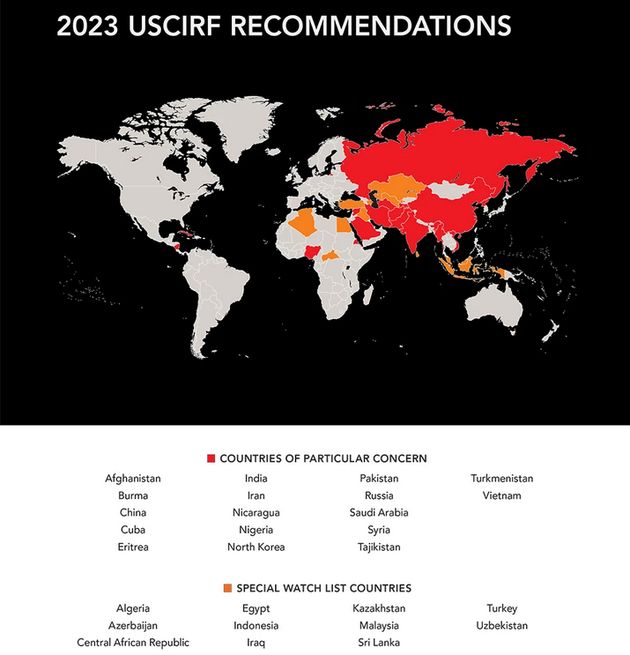France, Spain, Germany and Ukraine are mentioned in the 2023 USCIRF report, which was criticised for its way of addressing the persecution of Christians in Nigeria.
![Cathedral of Managua, Nicaragua. The Latin American county is in the Countries of Particular Concern list for the fist time. / Photo: [link] Oswaldo Flores Jiménez[/link], Unsplash CC0.](https://cms.evangelicalfocus.com/upload/imagenes/6458f4f0cdb57_oswaldofloresjimenez.jpg) Cathedral of Managua, Nicaragua. The Latin American county is in the Countries of Particular Concern list for the fist time. / Photo: [link] Oswaldo Flores Jiménez[/link], Unsplash CC0.
Cathedral of Managua, Nicaragua. The Latin American county is in the Countries of Particular Concern list for the fist time. / Photo: [link] Oswaldo Flores Jiménez[/link], Unsplash CC0.
The United States Commission on International Religious Freedom (USCIRF) recently released its 2023 Annual Report, which “identifies threats to religious freedom abroad”, and provides recommendations to protect freedom of religion or belief.
In this year Annual Report, USCIRF recommends to designate 17 countries as Countries of Particular Concern (CPCs) because “their governments engage in or tolerate systematic, ongoing, and egregious violations of the right to freedom of religion or belief”.
Cuba and Nicaragua are included in the list for the first time, along with Afghanistan, Burma (Myanmar), China, Eritrea, India, Iran, Nigeria, North Korea, Pakistan, Russia, Saudi Arabia, Syria, Tajikistan, Turkmenistan and Vietnam.
The report states that the government in Cuba “seeks total dominance over religious life in the country”, while “the regime in Nicaragua has sharply increased its persecution of the Catholic Church by imprisoning clergy, shuttering church-affiliated organizations, and prohibiting Catholic rituals”.
The USCIRF also recommends that countries such as Algeria, Azerbaijan, Egypt, Indonesia, Kazakhstan, Turkey, and Uzbekistan to be placed on the Special Watch List (SWL), due to “their governments’ perpetration or toleration of severe religious freedom violations”.

The USCIRF is “disheartened by the deteriorating conditions for freedom of religion or belief in some countries”, the report says. “We also stress the importance of Congress acting to prohibit any person from receiving compensation for lobbying on behalf of foreign adversaries, including those engaging in particularly severe violations of the right to freedom of religion”, said USCIRF Chair Nury Turkel.
Vice Chair Abraham Cooper, recognised that “throughout the past year, the U.S. government continued to condemn abuses of religious freedom and hold perpetrators accountable”, but it “should take additional steps to support freedom of religion around the world. We urge Congress and the Executive Branch to implement USCIRF’s recommendations”.
The report not only denounces violations that come from states, it also recommends the redesignation of seven Muslim groups: al-Shabaab, Boko Haram, Hay’at Tahrir al-Sham, the Houthis, Islamic State in the Greater Sahara, Islamic State in West Africa Province, and Jamaat Nasr al-Islam wal Muslimin, as Entities of Particular Concern.
Regarding the countries that are not CPCs or SWL, USCIRF mentions concerns about the religious rights of indigenous communities in Mexico, Chile, and Colombia; the vandalism against minority faiths in Germany, Italy and Spain; France and Switzerland banning the Muslim hijab, and that Ukraine might ban the Orthodox church ecclesiastically linked to Moscow.
At the same time, it highlights important global developments related to religious freedom during 2022, such as imposing targeted sanctions on religious freedom violators; recognizing the Myanmar military’s atrocities against Rohingya Muslims as genocide and crimes against humanity; and the United Arab Emirates, Argentina, and Bosnia efforts to fight against antisemitism.
USCIRF is “tremendously disappointed” that Nigeria and India were not included in the State Department’s designations of CPCs last December and asks the government to do so.
“There is no justification for the failure to recognize Nigeria or India as egregious violators of religious freedom. The State Department’s own reporting includes numerous examples of particularly severe religious freedom violations in Nigeria and India”.
It also calls for the appointment of a Special Envoy for Nigeria to address religious freedom violations.
Christian advocacy group ADF International also raised concern over the way the report addresses the persecution of Christians in Nigeria at the hands of Fulani, because it talks about abuse against the Muslim extremists in West and Central Africa. According to the USCIRF report, that led “some Fulani to arm themselves and conduct reprisal attacks based on ethno-religious identity”, and to Christian communities across Nigeria being “threatened by deadly attacks from vengeful assailants seeking retribution for grievances against Fulani Muslim civilians”.
ADF International spokesperson Sean Nelson said the report “fails to explain the broader context of religiously motivated violence against Christians, where they are suffering thousands of deaths every year because of their faith”. For Nelson, the report is “needlessly polarizing” and he suggests that USCIRF consider a retraction.
Read the full 2023 US Comission on International Religious Freedom annual report here.
[donate]

Las opiniones vertidas por nuestros colaboradores se realizan a nivel personal, pudiendo coincidir o no con la postura de la dirección de Protestante Digital.
Si quieres comentar o